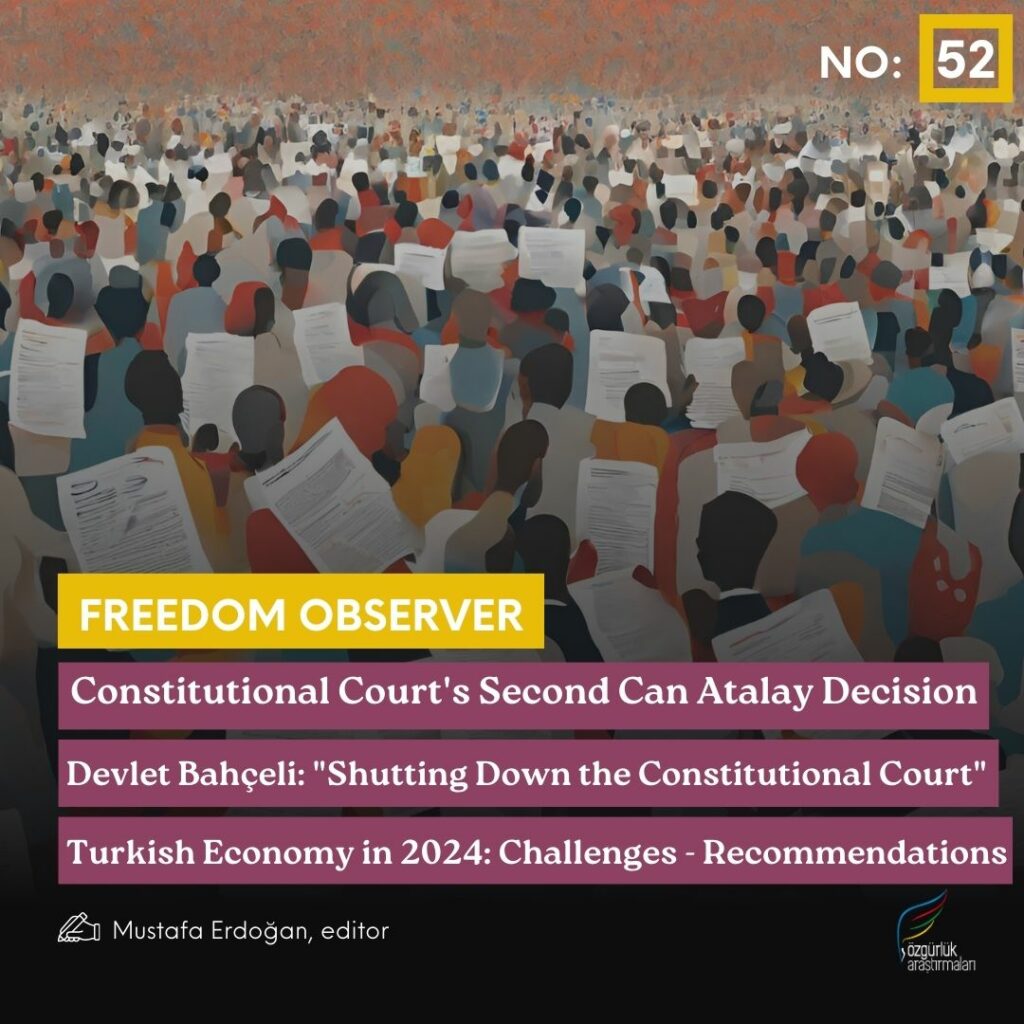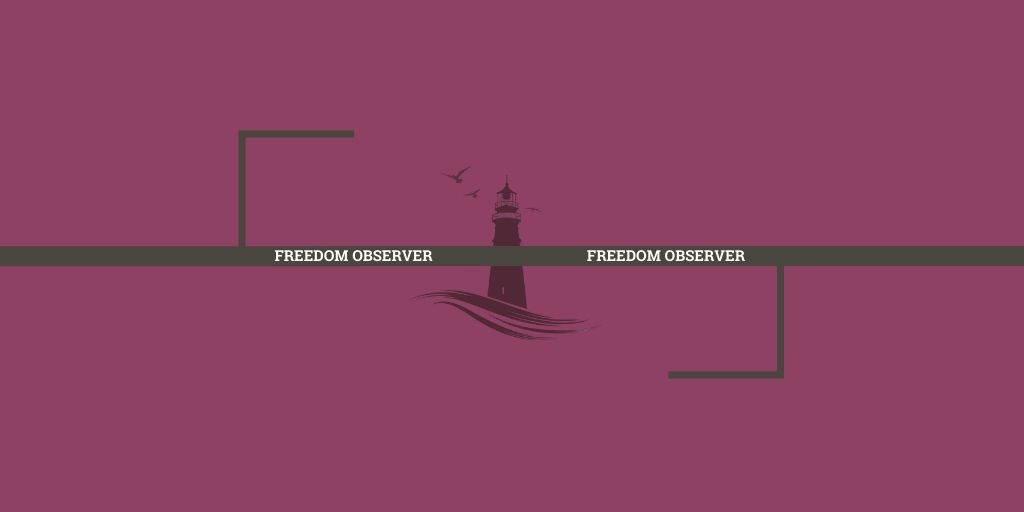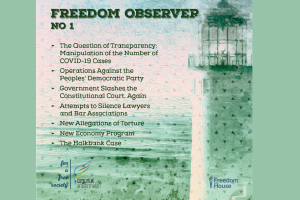
From Editor – in- Chef
Since the publication of the last issue of Freedom Observer, there have been significant developments on the political agenda.
As is well known, Can Atalay has yet to be released from prison, nor has he been able to take up his duties, despite having been democratically elected as an MP. The country has been dragged into an indefinite crisis, obviously created for political purposes. You will read the legal aspects of this incident below in A. Rıza Çoban’s article.
As for the unjust sanctions imposed on FOX TV by RTÜK regarding the series “Red Gonbons,” it is worth noting that RTÜK’s actions in this matter align with the policies of the ruling party. In this context, it becomes significant that the Ministry of National Education, through its cooperation agreements with the Presidency of Religious Affairs and specific traditionalist religious communities, has further introduced religious elements into an already contentious public education system.
These religious communities can only contribute to national education by imparting superstitious religious knowledge of questionable relevance to current scientific data and by indoctrinating students with religious dogmas. While the Minister, who shares a similar background with these religious communities, may not fully grasp the implications, those with an open mind can recognize the risks this poses to the future of Turkish society.
Meanwhile, a significant development went unnoticed by many: MP Ömer Faruk Gergerlioğlu’s bill to abolish the State of Emergency Decree Laws issued following the attempted coup in 2016 was rejected in Parliament. It should be remembered that these decrees served as the basis for numerous unjust and unlawful administrative actions, including the arbitrary dismissal of a significant number of individuals, including academics, referred to as “KHK’lılar” (“KHK victims”). Since these decrees have not been repealed, their effects continue to linger.
In this issue of Freedom Observer, you will also find Enes Özkan’s comprehensive assessment of the economic situation as we enter 2024, as well as Ö. Faruk Şen’s analysis of a recent verbal attack on the Constitutional Court by the President of the MHP.
As you can see, although the general outlook for the country may not be auspicious, we are left with no choice but to maintain hope for a better future.
Yes, we look forward to seeing you in 2024, in better days. Wishing everyone a prosperous New Year!
* Mustafa Erdoğan
Constitutional Court’s Second Can Atalay Decision
The Constitutional Court has made its second ruling on the application of Can Atalay, a Member of Parliament from Hatay representing the Workers’ Party of Turkey. Despite a previous decision by the Constitutional Court, he had not been released from prison.[1] On December 21, 2023, and subsequently published in the Official Gazette on December 27, 2023, the General Assembly determined that the applicant’s rights, including the right to vote and be elected, the right to liberty and security, as well as the right to individual application guaranteed under Article 148 of the Constitution, had been violated. This marks the first time the Constitutional Court has found a violation of the right to individual application since September 2012, when the individual application process was initiated.
As is well-known, the Constitutional Court had previously ruled that Can Atalay’s right to vote and be elected and his right to liberty and security were violated due to the rejection of his release request by the Court of Cassation after his election as an MP. This violation was further compounded by the decision that he could not benefit from legislative immunity, followed by the confirmation of his sentence.
To comply with the aforementioned decision, the Court forwarded it to the Istanbul 13th Assize Court, which is the Court of first instance, to conduct a retrial and determine the release of the applicant. However, the Istanbul 13th High Criminal Court pointed out that the violation stemmed from the decision of the 3rd Criminal Chamber of the Court of Cassation and, as a result, transferred the case file back to the 3rd Criminal Chamber of the Court of Cassation.
Interestingly, the Criminal Chamber of the Court of Cassation decided not to comply with the Constitutional Court’s decision, arguing that it exceeded its authority. Furthermore, the Criminal Chamber filed a criminal complaint against the members of the Constitutional Court who had concurred with the decision.
In response to these developments, Atalay’s legal representatives once again filed an application with the Constitutional Court. During the subsequent proceedings, the General Assembly of the Constitutional Court initially determined that the prerequisites outlined in its previous decision had not been met. The Constitutional Court found that the Istanbul 13th Assize Court and the 3rd Criminal Chamber of the Court of Cassation had failed to initiate a retrial process for the applicant, thus disregarding their constitutional and legal obligations. Consequently, the judgment enforcement continued, and the applicant’s convicted status remained unchanged. The Constitutional Court pointed out that this situation was in direct contradiction with the provision in the sixth paragraph of Article 153 of the Constitution, which stipulates that decisions of the Constitutional Court shall be binding on legislative, executive, and judicial bodies, administrative authorities, and both natural and legal persons.
The Constitutional Court also declared that the decision by the 3rd Criminal Chamber of the Court of Cassation to ‘not comply with the Constitutional Court’s decision’ was inconsistent with both the Constitution and Law No. 6216. It emphasized that there is no provision for such a decision in Law No. 5271 or any other existing laws (paragraph 53). The Constitutional Court, highlighting that the Court of Cassation lacks jurisdiction over the retrial process, firmly stated that the retrial file was adjudicated by a court lacking the necessary jurisdiction and authority. This action clearly violated the mandatory provision of Article 142 of the Constitution and the principle of the natural judge as stipulated in Article 37 of the Constitution (paragraph 54).
Reminding that the right to individual application under Article 148 of the Constitution is a fundamental constitutional right, the Court asserted that the effective enforcement of the Constitutional Court’s decisions is an integral component of the right to individual application. It stressed that failing to implement the judgments as outlined in the violation decision would constitute a severe and unmistakable infringement of the right to individual application. The Court emphasized that the non-execution of the Constitutional Court’s decisions following individual applications would render the entire process meaningless for individuals.
Furthermore, the Court underscored that the failure to implement these decisions would erode trust in the judiciary, violate individual rights, and run counter to the principles of the rule of law. As a result, the Court determined that the applicant’s rights, including the right to individual application, the right to vote and be elected, and the right to liberty and security of person, were infringed upon due to the failure to adhere to the Constitutional Court’s decisions, which are legally binding under the Constitution and existing laws.
In conclusion, to address the violations identified in both its prior judgment and the current one, the Constitutional Court has issued the following orders:
i. Commencement of retrial proceedings,
ii. Stay of execution of the conviction and release of the applicant from the penal institution,
iii. The termination of the applicant’s convicted status.
The Court also ordered that a copy of the judgment be forwarded to the Grand National Assembly of Turkey and the Council of Judges and Prosecutors for their information and interest. Additionally, the Court ruled that the applicant must pay 100,000 TL in net non-pecuniary damages.
The rationale behind sending the judgment to the Council of Judges and Prosecutors (HSK) is evident: judges who fail to implement the Constitutional Court’s rulings should be subject to administrative and criminal investigations. Nevertheless, the Istanbul 13th High Court of Appeals once again did not comply with this explicit decision and chose to send the case file back to the Court of Cassation.
It is evident that the responsibility for such a clear and persistent violation, as well as disregard for the Constitution, falls not only upon those who issued these decisions but also on the institutions authorized to investigate them.
* Ali Rıza Çoban – Constitutional Lawyer
Devlet Bahçeli Calls for Shutting Down the Constitutional Court
Nationalist Movement Party (MHP) leader Devlet Bahçeli made an assertive speech at his party’s group meeting and said that the Constitutional Court should be dissolved or restructured. In his remarks, Bahçeli targeted Constitutional Court President Zühtü Arslan with the words “Mr. Zühtü, who is pulling your strings” and said: “How will the black-robed collaborators explain the fact that the Constitutional Court urgently examined the case of the prisoner Can Atalay and found a violation of rights when there are 129,140 individual application files waiting to be discussed? Why and why is the same care and attention not shown for the closure of the HDP and other parties? President and members of the Constitutional Court, listen to me. I was entrusted with the land on the shoulders of our martyrs, and their murderers walked among us. Mr. Zühtü, who says that there can be no remote-controlled judiciary or judges, in whose hands is your rope?” Bahçeli also said about the martyrdom of 12 soldiers: “I wonder what the President and members of the Constitutional Court felt in the face of the martyr news? Did their calloused consciences tingle even a little?[1]
Bahçeli also stated, in reference to the HDP deputies, ‘We do not want terrorists in the Parliament. We do not want enemies. We do not want murderers. We don’t want the scoundrels who pat the backs of criminals,’ and he made a series of suggestions. First and foremost, Bahçeli proposed that the salaries of 57 HDP deputies and the Treasury aid allocated to the party should be immediately cut and redirected towards the fight against terrorism and the support of martyrs’ families. Bahçeli also demanded the resolution of pending immunity files concerning these deputies and their prosecution in Court, along with a redrawn definition of parliamentary immunity.
It is deemed unacceptable for Bahçeli to direct his criticisms towards institutions that serve as the bedrock of the constitutional order. The Constitutional Court, in its role as the guardian of individual rights and freedoms, stands as a pillar of legal protection for individuals against the power of the state. Bahçeli’s use of the phrase ‘who pulls your strings,’ specifically aimed at the President of the Constitutional Court, Zühtü Arslan, casts doubts on the independence of judiciary members and appears to exert political pressure on the judicial branch.
Likewise, the measures he proposes in the fight against terrorism could be viewed as sanctions that run counter to the principles of the rule of law and are fundamentally at odds with the presumption of innocence.
Devlet Bahçeli’s proposals, which link some members of parliament to terrorism and include measures like lifting their immunity and cutting their salaries, pose a significant risk to the democratic functioning of the parliament and the fundamental right to representation of these individuals. This goes beyond typical political disagreements and has the potential to further erode the core democratic principles and institutions that have already faced challenges in Turkey.
In summary, Bahçeli has adopted a harsh rhetoric that raises concerns about the constitutional order and democratic institutions, and it appears to be at odds with the norms of a democratic rule of law. For the sake of the political order and democratic institutions in Turkey, it would be prudent for him to reconsider this stance. Furthermore, such statements serve as a reminder of the importance for all political actors and state institutions to act responsibly by adhering to both national and international legal norms.
* Ömer Faruk Şen – Ph.D. – Missouri University
Turkish Economy in 2024: Challenges and Recommendations
In these bulletins, we typically assess the economy in the context of corporate developments. However, in this final bulletin of the year, we will delve into the economic data for 2024 and offer recommendations based on reports from research institutions and international organizations.
The year 2023 posed significant challenges for the Turkish economy. Global economic events, particularly the Russia-Ukraine conflict, exerted adverse effects on Turkey. In tandem with risks stemming from previous economic management, inflation continued its upward trajectory. In 2024, the performance of the Turkish economy will be contingent upon developments in the global economy and domestic policies in Turkey. Nevertheless, we anticipate a general slowdown in growth, persistently high inflation, and an increase in unemployment.
Economic Growth:
In 2023, the Turkish economy is projected to grow by 4.5%. This marks a significant deceleration compared to the 11.1% growth achieved in 2022. The sluggishness in the global economy and uncertainties in domestic policies may lead to a further slowdown, with growth expected to reach 2.9% in 2024.
Inflation:
In 2023, inflation in Turkey surged to over 60%, and the anticipated decrease did not materialize. High inflation rates in the global economy, coupled with uncertainties in domestic policies, suggest that inflation is poised to remain elevated in 2024.
Unemployment:
In 2024, Turkey’s unemployment rate is anticipated to surpass 15%, negatively impacting household welfare. The rising unemployment is expected to have an even more pronounced adverse effect since an increase in labor force participation is not foreseen. Furthermore, high inflation and escalating financing costs are likely to contribute to an economic growth slowdown, resulting in higher unemployment.
Rule of Law:
The erosion of the rule of law can lead to a decline in investment security and a slowdown in economic growth. In 2024, challenges related to the rule of law are projected to persist, making it increasingly challenging for the Turkish economy to attract foreign investment.
Recommendations for the Government of Turkey
The Turkish government needs to take the following steps to overcome the challenges it will face in 2024:
- To adapt to the slowdown in the global economy, undertake structural reforms to improve the efficiency and competitiveness of the Turkish economy:
- Continue raising interest rates and tightening fiscal policy to reduce inflation:
- Rate hikes will help reduce inflation by lowering inflation expectations.
- Fiscal policy tightening will help reduce inflation by reducing public spending and increasing tax revenues. Reducing indirect taxes and increasing the share of direct taxes in total tax revenues could bring about a significant improvement.
- Create Jobs and Regulate the Labor Market to Reduce Unemployment:
- To achieve this objective, the Turkish government could implement policies aimed at fostering investment, enhancing workforce qualifications, and regulating the labor market.
- Strengthening the Rule of Law:
To achieve this goal, the Turkish government could implement policies aimed at:
Ensuring the independence of the judiciary, ensuring the equal application of the law to all citizens, and reducing corruption. In 2024, the Turkish economy is expected to go through another challenging period due to the slowdown in the global economy and uncertainties in domestic policies. This will negatively affect the ability of the Turkish economy to generate prosperity and remain competitive. The steps that the Turkish government will take to overcome these challenges are critical for the future of the economy.
* Enes Özkan – Economist, Istanbul University
1 Şerafettin Can Atalay (3) [GK], B. No: 2023/99744, 21/12/2023, Şuradan erişilebilir: https://kararlarbilgibankasi.anayasa.gov.tr/BB/2023/99744
2https://www.gazeteduvar.com.tr/bahceli-dem-partili-milletvekillerinin-maasi-kesilsin-aym-kapatilsin-haber-1656737





